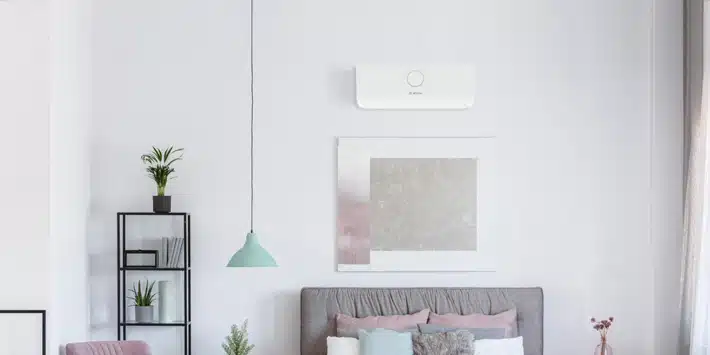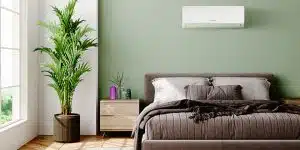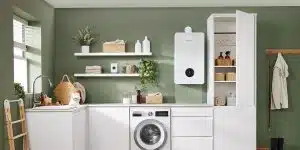If someone in your household suffers from asthma, hay fever, or allergies, you’ve probably heard the usual advice: “Keep windows closed during pollen season,” “vacuum regularly,” and “get a dehumidifier.” But here’s something you might not have considered: modern air conditioning could be one of the most effective tools for managing these conditions.
We know what you’re thinking. Air conditioning in the UK? For health reasons? It sounds like we’re trying to sell you something you don’t need. But stick with us, because the science behind air conditioning and indoor air quality is pretty compelling – especially for the millions of Brits dealing with respiratory issues.
With one in five people in the UK suffering from hay fever, around 5.4 million people living with asthma, and indoor air often being more polluted than outdoor air, creating a healthy indoor environment has never been more important. And that’s where air conditioning comes in.
The hidden health crisis in UK homes
Before we dive into how air conditioning helps, let’s talk about what’s actually floating around in your home’s air. Spoiler alert: it’s not as clean as you might think.
Indoor air is often more polluted than outdoor air. The Environmental Protection Agency describes indoor air pollution as one of the top five environmental health risks, and in 99% of UK homes, you’ll find at least one common indoor allergen. More than 70% of homes contain between three and six different allergens.
Common indoor allergens include:
- Dust mites (found in four out of five UK homes)
- Mould spores (thriving in our damp climate)
- Pet dander from cats, dogs, and other furry friends
- Pollen that sneaks indoors
- Volatile organic compounds (VOCs) from cleaning products and furniture
- Particulate matter from cooking and heating
For people with asthma or allergies, these aren’t just minor irritants – they’re genuine health threats that can trigger symptoms ranging from sneezing and watery eyes to serious asthma attacks.
The work-from-home factor: Since more of us are spending entire days indoors (thanks, remote work), indoor air quality has become even more critical. If your home office doubles as your allergy refuge, the air quality becomes doubly important.
How modern air conditioning transforms indoor air quality
Here’s where things get interesting. Modern air conditioning systems don’t just cool your home – they actively clean and condition the air you breathe. Think of them as sophisticated air treatment systems that happen to control temperature too.
Air filtration that actually works
Today’s air conditioning systems come equipped with advanced filtration that can remove a significant portion of airborne allergens:
- HEPA-grade filters: These capture 99.97% of particles that are 0.3 micrometers or larger, including dust, pollen, mould spores, and pet dander
- Multi-stage filtration: Many systems use pre-filters for larger particles, followed by high-efficiency filters for microscopic allergens
- Activated carbon filters: These tackle odours and volatile organic compounds (VOCs) that can irritate sensitive airways
Real-world impact: Studies show that air conditioning systems with proper filtration can reduce airborne allergens in a room by up to 50% within hours of operation.
Humidity control – the game changer
This might be the most underappreciated benefit. Air conditioning naturally dehumidifies the air, and that’s huge for allergy and asthma management.
Here’s why humidity control matters:
- Dust mites love humidity: They thrive in humidity levels above 60% but struggle to survive when humidity drops below 50%
- Mould prevention: Keeping humidity between 40-50% dramatically reduces mould growth
- Comfort zone: The ideal humidity level for people with respiratory conditions is between 40-60%
Keeping outdoor allergens where they belong
When your air conditioning is running, you keep windows and doors closed. This creates a sealed environment where outdoor allergens like pollen can’t infiltrate your home. During peak pollen season, this alone can be life-changing for hay fever sufferers.
As one respiratory specialist puts it: “Air conditioning helps people with asthma because doors and windows are kept shut, which helps keep pollens and other outdoor irritants and allergens out of the home.”
The specific benefits for asthma and allergy sufferers
For asthma management:
Modern air conditioning systems provide several key benefits for people with asthma:
- Consistent temperature control: Sudden temperature changes can trigger asthma attacks. Air conditioning maintains steady, comfortable temperatures
- Reduced airborne triggers: By filtering out dust, pollen, and other particles, air conditioning removes many common asthma triggers from your breathing space
- Lower humidity: Dust mites and mould – two major asthma triggers – struggle in properly dehumidified environments
Studies have shown that people with asthma who use air conditioning with proper filtration experience fewer symptoms and better quality of life.
For hay fever relief:
If you’re one of the 20% of Britons who suffer from hay fever, air conditioning can be particularly beneficial:
- Pollen barrier: Keeping windows closed during high pollen days prevents outdoor allergens from entering your home
- Air filtration: HEPA filters can capture pollen particles before they reach your airways
- Humidity control: Proper humidity levels can reduce nasal congestion and sinus pressure
For general allergies:
Air conditioning addresses multiple allergy triggers simultaneously:
- Removes airborne pet dander
- Reduces dust mite populations through humidity control
- Filters out mould spores
- Minimises exposure to outdoor pollution and allergens
Air conditioning vs traditional air purifiers
You might be wondering: “Why not just buy a standalone air purifier instead?” It’s a fair question, and air purifiers certainly have their place. But here’s how air conditioning compares:
Coverage: Air conditioning treats your entire home or specific zones, while most air purifiers only cover single rooms
Multi-function: Air conditioning provides temperature control, humidity management, and air filtration in one system
Integration: Built-in HVAC filtration runs continuously whenever your system operates, providing consistent air treatment
Cost efficiency: When you factor in the need for multiple air purifiers to cover a whole home, integrated air conditioning filtration can be more cost-effective
That said, the best approach for severe allergies might combine both: air conditioning for whole-home treatment and high-quality air purifiers in specific rooms like bedrooms.
The work-from-home air quality connection
With more people working from home than ever, indoor air quality has taken on new importance. Your home office might be where you spend 8+ hours a day, and poor air quality can affect not just your health but your productivity and focus too.
Common home office air quality issues:
- Poor ventilation leading to CO2 buildup
- Dust accumulation in less-frequently cleaned spaces
- Printer emissions and office equipment off-gassing
- Lack of air circulation in converted spaces
How air conditioning helps:
- Provides consistent fresh air circulation
- Filters out particles from office equipment
- Maintains optimal humidity for comfort and health
- Creates a controlled environment for better focus and wellbeing
For people with asthma or allergies who work from home, air conditioning can mean the difference between productive days and constant symptom management.
Choosing the right system for health benefits
Not all air conditioning systems are created equal when it comes to air quality benefits. Here’s what to look for:
Filtration capabilities:
- MERV 11-13 filters for good general filtration
- HEPA-grade filtration for maximum allergen removal
- Multi-stage filtration systems for comprehensive air cleaning
Humidity control features:
- Built-in dehumidification (standard in most modern systems)
- Humidity monitoring and control
- Proper sizing to maintain optimal humidity levels
Air circulation:
- Variable speed fans for consistent air movement
- Proper system sizing for your space
- Zone control for targeted treatment of specific areas
Maintenance accessibility:
- Easy filter access for regular changes
- Filter replacement indicators
- Professional servicing capabilities
Maintenance for optimal air quality
To get the maximum health benefits from your air conditioning system, proper maintenance is crucial:
Regular filter changes:
- Replace filters every 1-3 months during heavy use periods
- Use high-quality filters appropriate for your system
- Check filters more frequently during high pollen seasons
Professional servicing:
- Annual professional maintenance to ensure optimal performance
- Duct cleaning when necessary
- System inspection to identify any issues affecting air quality
Daily practices:
- Run the system regularly to maintain air circulation
- Use appropriate temperature and humidity settings
- Keep vents unobstructed for proper airflow
Real-world results: what to expect
Timeline for improvement:
- Immediate: Temperature and humidity control, basic particle filtration
- Within hours: Significant reduction in airborne allergens
- Within days: Noticeable reduction in dust accumulation
- Within weeks: Improved symptoms for many allergy and asthma sufferers
What people report:
- Better sleep quality due to cleaner air and optimal temperature
- Reduced need for allergy medications during peak seasons
- Fewer asthma attacks and respiratory symptoms
- Improved overall comfort and wellbeing at home
Realistic expectations: Air conditioning isn’t a miracle cure, but it can significantly reduce exposure to airborne triggers and create a more comfortable environment for managing respiratory conditions.
The investment in your health
While we’ve covered the costs of running air conditioning in previous articles, it’s worth considering the health ROI:
Potential health cost savings:
- Reduced spending on allergy medications
- Fewer GP visits for asthma or allergy-related issues
- Better sleep leading to improved overall health
- Reduced sick days due to respiratory symptoms
Quality of life improvements:
- More comfortable working from home
- Better sleep during hot weather and high pollen seasons
- Reduced stress from managing chronic symptoms
- Peace of mind knowing your home environment supports your health
Making the decision: is air conditioning right for your health needs?
Air conditioning can be particularly beneficial if you:
- Have asthma, hay fever, or other respiratory allergies
- Work from home and spend significant time indoors
- Live in an area with high pollen counts or air pollution
- Have family members with respiratory sensitivities
- Struggle with humidity-related comfort issues
- Want comprehensive air quality management
When to consider it a priority:
- Existing air quality measures aren’t providing adequate relief
- Multiple family members have respiratory issues
- You’re planning home improvements anyway
- Work-from-home arrangements are permanent
The bottom line on air conditioning and health
Modern air conditioning systems offer far more than just cooling – they provide comprehensive indoor air quality management that can significantly benefit people with asthma, allergies, and other respiratory sensitivities.
With one in five people in the UK suffering from hay fever and millions more dealing with asthma and allergies, creating a healthy indoor environment isn’t a luxury – it’s a necessity. Air conditioning systems with proper filtration and humidity control can remove allergens, maintain optimal conditions, and provide a refuge from outdoor air quality issues.
The key is choosing the right system for your needs and maintaining it properly. When done correctly, air conditioning doesn’t just make your home more comfortable – it makes it healthier.
For families dealing with respiratory issues, especially those working from home, the investment in good air conditioning can pay dividends in improved health, better sleep, reduced symptoms, and overall quality of life.
Thinking about how air conditioning could improve your family’s health and comfort? Our experienced team can assess your home’s specific needs and recommend the best air quality solutions. Get in touch for a free consultation – because everyone deserves to breathe easy in their own home.





